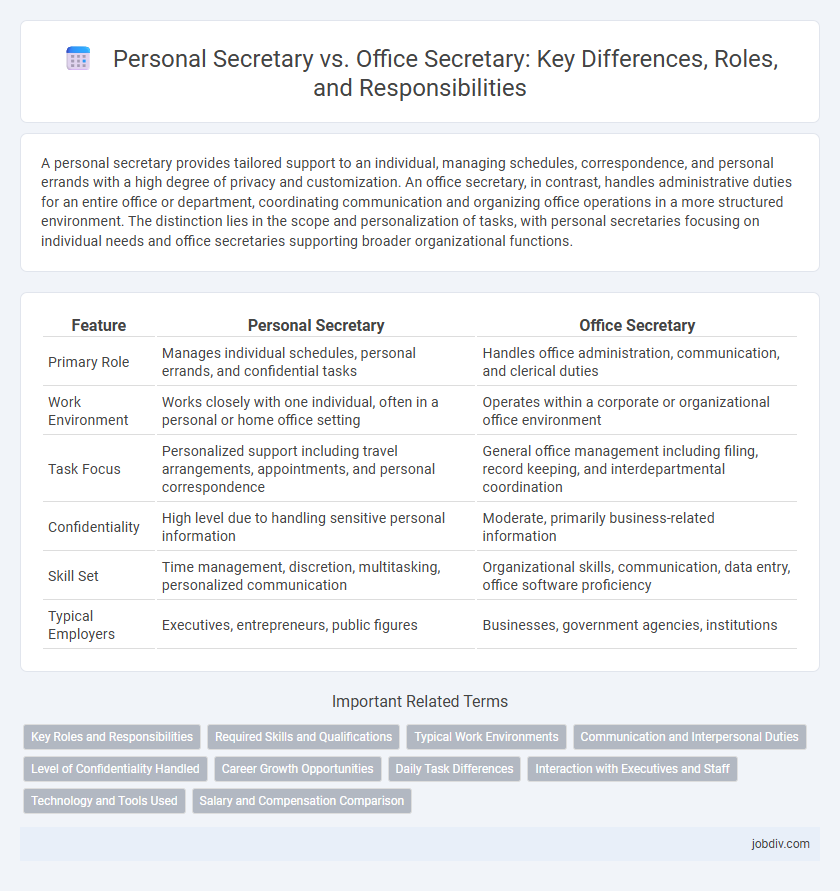A personal secretary provides tailored support to an individual, managing schedules, correspondence, and personal errands with a high degree of privacy and customization. An office secretary, in contrast, handles administrative duties for an entire office or department, coordinating communication and organizing office operations in a more structured environment. The distinction lies in the scope and personalization of tasks, with personal secretaries focusing on individual needs and office secretaries supporting broader organizational functions.
Table of Comparison
| Feature | Personal Secretary | Office Secretary |
|---|---|---|
| Primary Role | Manages individual schedules, personal errands, and confidential tasks | Handles office administration, communication, and clerical duties |
| Work Environment | Works closely with one individual, often in a personal or home office setting | Operates within a corporate or organizational office environment |
| Task Focus | Personalized support including travel arrangements, appointments, and personal correspondence | General office management including filing, record keeping, and interdepartmental coordination |
| Confidentiality | High level due to handling sensitive personal information | Moderate, primarily business-related information |
| Skill Set | Time management, discretion, multitasking, personalized communication | Organizational skills, communication, data entry, office software proficiency |
| Typical Employers | Executives, entrepreneurs, public figures | Businesses, government agencies, institutions |
Key Roles and Responsibilities
A personal secretary primarily manages the executive's schedule, handles confidential correspondence, and coordinates personal and professional tasks to ensure seamless daily operations. An office secretary oversees administrative duties such as managing office supplies, organizing meetings, handling general inquiries, and maintaining records to support the entire office staff. Both roles require strong organizational skills, but a personal secretary focuses more on individual support, while an office secretary emphasizes broader office management.
Required Skills and Qualifications
Personal Secretaries require strong interpersonal communication, exceptional organizational skills, and discretion to manage confidential matters for high-profile individuals, often necessitating experience in executive support and proficiency in scheduling software. Office Secretaries need expertise in office administration, multitasking abilities, and familiarity with office management tools, along with qualifications like a diploma in office administration or related fields. Both roles demand excellent time management, attention to detail, and proficiency in Microsoft Office Suite, but Personal Secretaries emphasize personal assistance and confidentiality more than Office Secretaries.
Typical Work Environments
Personal secretaries typically work in private or executive environments, supporting individual executives or high-profile clients with tailored administrative tasks. Office secretaries operate within broader office settings, managing general clerical duties across multiple departments in corporate, educational, or governmental organizations. The distinct work environments influence the scope of responsibilities and interaction levels with team members.
Communication and Interpersonal Duties
Personal secretaries excel in tailored communication, managing confidential information and maintaining close rapport with executives to anticipate their needs. Office secretaries facilitate broader organizational communication, coordinating between departments and handling multiple stakeholder interactions efficiently. Both roles require strong interpersonal skills, but personal secretaries prioritize individualized liaison while office secretaries emphasize collaborative office dynamics.
Level of Confidentiality Handled
A personal secretary manages highly confidential information related to an individual's private and professional matters, often handling sensitive personal correspondence and schedules. Office secretaries typically deal with broader organizational data, which may include confidential company policies but usually at a less intimate level. The level of confidentiality managed by a personal secretary is generally higher due to direct access to personal and strategic information.
Career Growth Opportunities
Personal secretaries often experience focused career growth by developing specialized skills tailored to senior executives, leading to opportunities in executive management or personalized consulting roles. Office secretaries gain broader administrative experience across departments, which can facilitate advancement into office management or operations coordination positions. Both roles require strong organizational abilities but differ in career trajectories, with personal secretaries leaning towards executive support careers and office secretaries building foundational skills for management roles.
Daily Task Differences
A Personal Secretary primarily manages scheduling, correspondence, and personal errands tailored to an individual's needs, often handling confidential information and prioritizing personalized support. An Office Secretary focuses on administrative duties such as filing, answering phones, coordinating office activities, and supporting multiple staff members to ensure smooth office operations. Daily tasks for Personal Secretaries are more personalized and client-centric, whereas Office Secretaries engage in broader organizational responsibilities.
Interaction with Executives and Staff
A Personal Secretary interacts primarily with a specific executive, managing tailored schedules, confidential communications, and personalized requests to streamline that executive's productivity. An Office Secretary coordinates communication and tasks across various departments, facilitating smooth workflows and supporting multiple staff members to maintain overall office efficiency. Both roles require strong interpersonal skills, but the Personal Secretary's interaction is more intimate and executive-focused, while the Office Secretary handles broader organizational engagement.
Technology and Tools Used
A Personal Secretary primarily utilizes digital calendars, voice recognition software, and secure cloud storage to manage private schedules and confidential communications efficiently. An Office Secretary relies heavily on office management systems, shared communication platforms like Microsoft Teams, and enterprise resource planning (ERP) software for coordinating team tasks and handling corporate documentation. Both roles require proficiency in productivity tools such as Microsoft Office Suite and advanced email management systems to streamline workflow and enhance organizational efficiency.
Salary and Compensation Comparison
Personal secretaries typically earn higher salaries than office secretaries due to the specialized nature of their tasks and closer working relationship with executives, with average annual compensation ranging from $45,000 to $70,000. Office secretaries generally receive lower pay, averaging between $30,000 and $50,000 per year, reflecting broader administrative duties and less personalized job scope. Benefits packages for personal secretaries often include bonuses and performance incentives, whereas office secretaries mainly receive standard health and retirement benefits.
Personal Secretary vs Office Secretary Infographic

 jobdiv.com
jobdiv.com